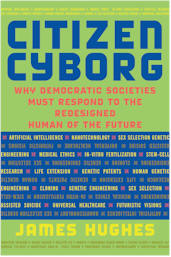Citizen Cyborg: Why Democratic Societies Must Respond to the Redesigned Human of the Future
July 16, 2010
- author |
- James Hughes
- year published |
- 2004
 Amazon | In the next fifty years, life spans will extend well beyond a century. Our senses and cognition will be enhanced. We will have greater control over our emotions and memory. Our bodies and brains will be surrounded by and merged with computer power. The limits of the human body will be transcended as technologies such as artificial intelligence, nanotechnology, and genetic engineering converge and accelerate. With them, we will redesign ourselves and our children into varieties of posthumanity.
Amazon | In the next fifty years, life spans will extend well beyond a century. Our senses and cognition will be enhanced. We will have greater control over our emotions and memory. Our bodies and brains will be surrounded by and merged with computer power. The limits of the human body will be transcended as technologies such as artificial intelligence, nanotechnology, and genetic engineering converge and accelerate. With them, we will redesign ourselves and our children into varieties of posthumanity.
This prospect is understandably terrifying to many. A loose coalition of groups-including religious conservatives, disability rights and environmental activists-has emerged to oppose the use of genetics to enhance human beings. And with the appointment of conservative philosopher Leon Kass, an opponent of in-vitro fertilization, stem cell research and life extension, to head the President’s Council on Bioethics, and with the recent high-profile writings by authors like Francis Fukuyama and Bill McKibben, this stance has become more visible – and more infamous – than ever before.
In the opposite corner a loose transhumanist coalition is mobilizing in defense of human enhancement, embracing the ideological diversity of their intellectual forebears in the democratic and humanist movements. Transhumanists argue that human beings should be guaranteed freedom to control their own bodies and brains, and to use technology to transcend human limitations.
Identifying the groups, thinkers and arguments in each corner of this debate, bioethicist and futurist James Hughes argues for a third way, which he calls democratic transhumanism. This approach argues that we will achieve the best possible posthuman future when we ensure technologies are safe, make them available to everyone, and respect the right of individuals to control their own bodies.
Hughes offers fresh and controversial answers for many other pressing biopolitical issues-including cloning, genetic patents, human genetic engineering, sex selection, drugs, and assisted suicide-and concludes with a concrete political agenda for pro-technology progressives, including expanding and deepening human rights, reforming genetic patent laws, and providing everyone with healthcare and a basic guaranteed income.
A groundbreaking work of social commentary, Citizen Cyborg illuminates the technologies that are pushing the boundaries of humanness-and the debate that may determine the future of the human race itself.